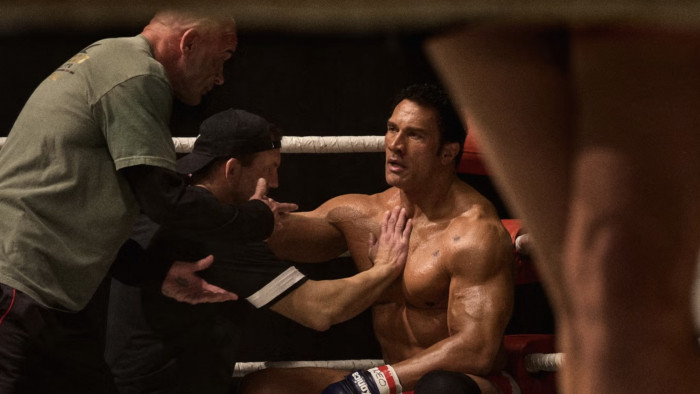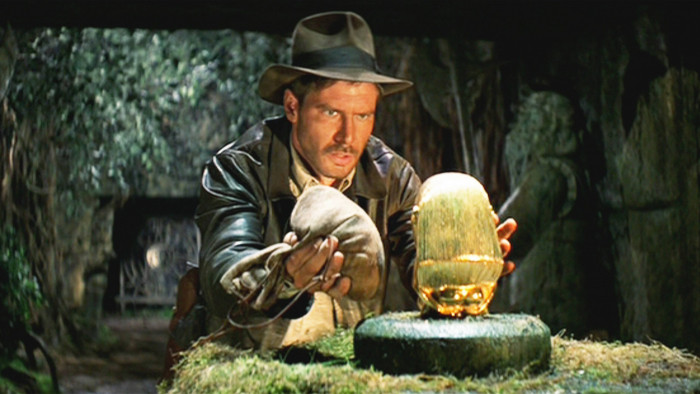"There’s a misconception that I’ve come from the tortured streets": A sunny afternoon with Idris Elba
Stopping to smell the flowers with Hollywood’s most in-demand man


“Don’t get naked”
These are Idris Elba’s words of advice for me as I glug down my third glass of pink champagne.
It’s probably sound advice. We’re at a party in a swish Ibizan villa to celebrate Italian socialite Magda Pozzo’s birthday. Surprisingly few of my Saturday nights feature millionaires’ birthday parties, so I can only assume that such events are Bacchanalian enough without adding tonight’s Studio 54 theme.
By ‘theme’ I mean little touches such as hiring Kenny Carpenter, the original Studio 54 DJ, and projecting the famous club’s logo on to a neighbouring peninsula. There are dancers in cages and dancers dressed as snowballs (I think). There are thin, glamorous, wealthy women at various stages of life and plastic surgery; there are older, also wealthy, men with women who I hope are their daughters. There’s a giant pink rocking horse. There are, when I open the door of a portable toilet, the genitals of a tiny bearded man in a sequinned bomber jacket. There’s a packed dancefloor jiving to Kenny’s disco classics. There’s a free bar. There’s not one person having a bad time.
It’s not a natural setting for a man raised on east London council estates, and yet Elba – his 6ft 3in cruiserweight frame wrapped in a grey polo shirt and jeans – is the star here. Among the old men, old women and old money, there he is, the one they all want to be with. Sadly for them, he has to go. His clothing advice dispensed, he’s off to do his own DJ set at legendary home of eye-watering bar bills Pacha. He bids me farewell and I’m left to get my groove on.

Elba is a busy man. His CV includes DJ, actor, writer, director, producer (of music, film and TV), presenter, clothes designer and man who attends flashy birthday parties. People have a bizarre preoccupation with his kind: celebrities who do more than one thing. Elba finds it amusing.
“The actor, the DJ, producer, director – and sometimes they throw in the rapper,” he says, when we meet for lunch earlier in the day. I’ve never heard him rap, so I don’t know if he’s being self-deprecating or self-lauding.
Is his rapping good? What does he think of it? I do what all British people do when trying to avoid an awkward situation: I chuckle.
”He laughed politely and moved on,” says Elba.
“The midlife-crisis thing is not to be sniffed at”
Oh no, does he think I’m laughing at his rapping? I can’t read him. I chuckle again. I don’t know why: if he’s offended, that’ll make it worse. Thankfully, Elba laughs, too, and we move on. You really notice when he laughs. It’s like a small volcano erupting, his body shuddering like the island it sits on. You half expect to see tiny inhabitants fleeing to his coast.
We’re outside a restaurant called Calma, sitting roughly one foot away from the crystal waters of the Med. Across the water is Lio, the restaurant/club/cabaret where Elba has a 16-week Sunday-night summer residency. (The day after we meet is week 11, he thinks.) He’s ordered lamb chops and we’re sharing a burrata salad that is more pizza than salad – no complaints there. Like the party, this lunch is not a sober affair.
I drink beer, while he drinks a very large, very strong vodka and Purdey’s (he’s an ambassador for the vitamin drink brand, but clearly puts his mouth where the money is). This is how he likes to do interviews, he tells me: “I build trust with you. We have a drink, we’re in a moment.” I like it. The sun is out, Elba is relaxed and I’m at a two-drink peak.

He’s at pains to point out that his apparent omnipresence is an illusion, while also admitting that, aged 45, something of a midlife crisis pushes him to try things (“The midlife-crisis thing is not to be sniffed at”). But it’s not the number of his activities that’s remarkable, it’s the vitality required to do them. The man radiates energy like a badly wired appliance. Maybe it’s the drink. I call to the waiter: I’ll have what he’s having, thanks.
If you know your arse from your Elba-bow, you’ll know that the latest string to be added to it is directing. Yardie is adapted from Victor Headley’s 1992 novel of the same name. It follows Dennis ‘D’ Campbell (Aml Ameen), the Yardie of the title, from a troubled adolescence in Jamaica to a troubled adulthood in London. Yes, the man who played Stringer Bell is taking on a gangster movie.
I ask if there was any trepidation ahead of his latest career move. “For sure,” he says. “As much as I’ve worked on stuff, I had no real understanding of what it meant to be a director. It’s one of those things I dreamed up: ‘I can do that.’ Then someone says I can actually do it and I think, ‘What?! OK, where do I start?’ It’s delegation, man; finding the best people who could interpret my brain dumps. I’ve got muscle memory from every film and TV show I’ve made, watching Ridley Scott, Guillermo Del Toro. I had that sort of Rolodex in my head, and then the will, a good script and great actors.”
As mentioned, Elba grew up in London, spending his first 11 years in Hackney before moving to Canning Town. He turned 13 in 1985, the year in which ‘D’ lands in London. For a young black man in that part of the world, at that time, Caribbean gangs would have been hard to avoid.
“In doses,” he says. “In Hackney I lived in front of Hardie Estate, which was notorious. There were pockets of the Yardie lifestyle, the war between Yardie Jamaicans and Scotland Yard. You saw it all the time. Canning Town was a different set of ingredients. The black and Indian kids there were more persecuted by racists, the National Front. You’d be walking down the street and someone would call you a black bastard. People weren’t putting tyres around us; it was more a constant presence of casual racism.”
It was a different London in many ways, but not, sadly, in others. Can he empathise with young men who join gangs?
“I think for kids that go into gangs, your magnet is being accepted into a group, feeling like you’re coming from somewhere. When I was at school, we had houses – as in Grenfell House, Scott House, etc. I was in Grenfell and all the Grenfell men in the school used to look after each other. It’s as simple as that. The reason kids get into gangs is not as complex as some might see it as, and in other areas, it is very complex.”

It’s not the first time Elba has tapped into his childhood experiences. He wrote and directed an episode of Playhouse Presents called King For A Term and created Sky sitcom In The Long Run. Both, like Yardie, were set in the Eighties, and in each he played a ‘version’ of his late Sierra Leonean father Winston (his mother, Eve, is Ghanaian). Unlike Yardie, they’re comedies. He says they weren’t tributes to his dad, but ways of portraying a place and period for future generations.
“It’s more a comment on a part of my life,” he says. “There’s a misconception that I’ve come from the tortured streets and seen some really dark days. I’ve seen lots of stuff, but I have fond memories of my childhood. The idea was to get an audience to go, ‘Yeah, I remember them days.’ Or educate their young ones and go, ‘Mate, this is what it was like.’”
For a man now fawned over at millionaire-strewn shindigs and who spun discs at his friends Harry and Meghan’s wedding reception, that past is important.
“It’s a way of giving context. I can talk about the future all day, but actually, I wouldn’t mind telling you about where I’ve come from. Somewhere within that you might see parallels with your own journey. I think that’s why I’m in the art of telling stories. When I DJ, I’m in another place altogether. Come see Idris and you won’t see anything about the past. It’s just ‘woop, woop, woop’ banging house music. I think we all have multiple personalities; it’s just having the confidence to jump in the shoes of that one or that one and just be that.”
“I don’t know what the f*ck I’m doing. Do I still have fears as a human being? Of course”
Elba is occasionally wary during our talk, checking that I’m not going to take him out of context (understandable in these mercilessly judgemental times). This is because he’s being very honest, he tells me, honestly. He’s honest when he answers questions, honest when he doesn’t want to.
Honesty is something of a trademark of his. For an episode of his Discovery Channel show Idris Elba: No Limits, he learned, in six weeks, to fly a stunt routine in a light aircraft. This is despite, as he reveals, being both afraid of heights and claustrophobic. He was frightened, he admits, but says that since he was small, he’s been determined not to show it.
“I’m basically admitting I don’t know what the f*ck I’m doing,” he tells me, chewing on his lamb chops. “Do I still have fears as a human being? Of course. I have programmed myself not to show them, especially if it means not being able to accomplish something.” It’s not to stop him being seen as vulnerable; it’s to stop the fear from overwhelming him. “Exactly. People can see me sh*tting my pants, which is what those shows are about, but what they don’t see is me going, ‘I’m not doing it because I’m scared.’ They know I’m scared and I’m doing it. If I would like to be remembered for anything, as egotistical as it sounds, I want people to think, ‘F*cking hell, man. If he can do it, I can do it.’
“Where masculinity is concerned, vulnerability is a breath of fresh air. It’s me saying I have fears, too. That’s a reality. That’s just a natural [part of] evolution.”

The following night, I go to see him play at Lio. He’s in his zone, banging house tunes. This is contemporary Elba, not nostalgic Elba, although a couple of disco tracks sneak in: a nod, I assume, to Kenny and Studio 54. But I want to know about future Idris Elba. What could he do, I ask, as we stand up to leave. He acts, he makes music, so he could do a musical, I joke.
“I’m doing a musical,” he says. Of course, he is. “I’m doing [that’s Elba speak for producing, directing and starring in] The Hunchback Of Notre Dame.” I had no idea it was going to be a musical. “Yep. I also did an album called Mi Mandela. There’s a song on it called Tree. I’m doing a stage musical based on that next year.”
Anything else?
“I know what you’re trying to do,” he says, laughing.
I think he thinks I’m trying to ask about him playing James Bond. I’m not. I was going to, because he looked a natural in Bastille Day and, at the time of our meeting, he was still odds-on favourite to take over the most iconic role in cinema. But other than one tweet – “The name’s Elba, Idris Elba” – which caused many people to completely misplace the location of their sh*t, he’s firmly denied any involvement, exercised his licence to kill the rumours.
Why the reaction to that tweet remains significant though, is because whether he becomes Bond or not, people wanted him to be Bond: the boy from the council estate, the son of African immigrants, wanted by the British to play our most notable fictional representative.
And maybe if we want that, we’re getting somewhere.
Elba is brand ambassador for Purdey’s. His directorial debut Yardie is at cinemas from 31 Aug; StudioCanal
(Photography: Zoe McConnell)
Latest
Related Reviews and Shortlists


The 10 best war movies of the 21st century








